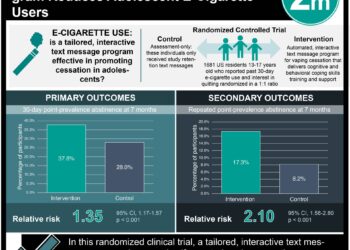E-cigarette use may hamper smoking cessation for smokers planning to quit post-hospitalization
1. In a study of hospitalized smokers who planned to quit smoking post-discharge, users of e-cigarettes were not as likely as nonusers to refrain from using tobacco at 6 months.
2. However, e-cigarette use in the study population was irregular; further research is necessary to study whether regular e-cigarette use helps or hampers efforts to quit smoking.
Evidence Rating Level: 1 (Excellent)
Study Rundown: Many cigarette smokers use e-cigarettes to assist with efforts to quit smoking. However, it is unknown if e-cigarettes are effective aids for cessation. The authors carried out a secondary analysis of information from a large randomized controlled trial (RCT) of smokers who were in the hospital and intended to quit smoking following discharge. The authors examined whether or not using e-cigarettes following discharge from the hospital was linked to future abstinence from tobacco among 1 357 smokers intending to quit. At 1 and 3 months post-discharge, self-reported e-cigarette use was collected. Abstinence from tobacco was confirmed biochemically at 6 months. The authors found that 28% of smokers trying to quit used e-cigarettes by 3 months post-discharge. However, few smokers used them consistently. E-cigarette use was linked to decreased tobacco abstinence at 6 months compared to non-users. Further research is necessary to study whether regular e-cigarette use helps or hampers efforts to quit smoking in a larger patient population.
A strength of the study is that it was the first (to the authors’ knowledge) to evaluate an interaction between e-cigarette use and treatment. Limitations include self-selected e-cigarette use by the participants and use of self-reported data. Furthermore there was also possible unmeasured confounding, meaning no conclusion can be made regarding a causal relationship.
Click to read the study, published today in Annals of Internal Medicine
Relevant Reading: Electronic cigarettes for smoking cessation: a randomised controlled trial
In-Depth [randomized controlled trial]: The authors used data from a large RCT to carry out a secondary analysis. The original RCT involved 1 357 hospitalized smokers who intended to cease smoking post-discharge. During their hospitalization, the smokers received counseling for smoking cessation. At discharge, the smokers were assigned at random to a control group (a recommendation for tobacco treatment) or intervention group (tobacco treatment at no cost). At 1 and 3 months post-discharge, self-reported e-cigarette use was collected. At 6 months, abstinence from tobacco was lab-confirmed. Within 3 months post-discharge, 28% of participants reported e-cigarette use. Pairs were propensity score-matched. Analysis of these pairs (n = 237) indicated that users of e-cigarettes were not as likely as nonusers (10.1% vs. 26.6%) to refrain from using tobacco at 6 months. The propensity score analysis indicated that there was a large negative association between use of e-cigarettes and abstinence from smoking. However, there are many variables to factor into this association, including irregular e-cigarette use, possible initiation of e-cigarette use after failure of established cessation aids, concurrent e-cigarette use and evidence-based treatment for smoking cessation, and use of e-cigarettes by smokers lacking access to conventional cessation aids.
Image: PD
©2018 2 Minute Medicine, Inc. All rights reserved. No works may be reproduced without expressed written consent from 2 Minute Medicine, Inc. Inquire about licensing here. No article should be construed as medical advice and is not intended as such by the authors or by 2 Minute Medicine, Inc.


![Active smoking cessation intervention may provide tangible results [Project CLIQ]](https://www.2minutemedicine.com/wp-content/uploads/2014/12/smoking-e1418644951268-350x250.jpg)




